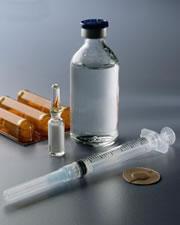 The UK is questioning how drug trials should be done in future to avoid such dramatic accidents.Getty
The UK is questioning how drug trials should be done in future to avoid such dramatic accidents.GettyDoctors who treated the patients in the infamous London drug trial in March have confirmed that they suffered an immune reaction called a cytokine storm. The verdict supports the theories put forward by immunologists in the immediate aftermath of the trial, which put the six participants in intensive care.
The drug at the centre of the trial, called TGN1412, was an experimental 'super-antibody' drug designed to boost the immune system. But when given to the previously healthy volunteers it caused a massive release of inflammatory molecules called cytokines, report Ganesh Suntharalingam and his colleagues, who treated the victims at London's Northwick Park Hospital. They report their findings in the New England Journal of Medicine1.
“Their appearance was not particularly unusual by intensive care standards.”
Ganesh Suntharalingam,
Northwick Park Hospital
The event became known as the 'elephant man' drug trial after media reports quoted comments made by the girlfriend of one of the participants. Suntharalingam clarifies that much of the patients' swelling was not a direct result of the drug, but rather an effect of the treatment doctors used to combat the drug's negative effects: patients were given large amounts of fluid to replenish that lost through leaking blood vessels. "They became very swollen. That can look distressing, but you see it often in severely ill patients," he told news@nature.com. "Their appearance was not particularly unusual by intensive care standards."
Immunologists had suspected that the symptoms, which included headaches, multiple organ failure and capillary leakage, were the result of cytokine release from immune cells called helper T cells (see 'Can super-antibody drugs be tamed?'). The drug was designed to bypass one of the control points for T-cell activation and had performed well in animal trials.
The data produced by Suntharalingam and his colleagues come from blood samples and other medical tests carried out on the volunteers during the 30 days after the trial. Any later effects of the drug or the treatment, Suntharalingam says, are still subject to patient confidentiality.
ADVERTISEMENT
He was therefore unable to comment on recent reports, originating with the patients' lawyers, that some of the volunteers are now showing early signs of cancer and severe immune disease. Such statements, he said, could compromise the outcome of legal proceedings that are currently under way. The German company TeGenero that developed the drug has since gone bankrupt.
A UK government expert working group, set up after the incident, advised this July that drug trials should not give a new medicine to many volunteers at the same time, along with other recommendations to avoid similar accidents. This advice is open for comment until a final report is issued later this year.
Visit our confirmsfateofeleph.html">newsblog to read and post comments about this story.
Northwick Park Hospital
